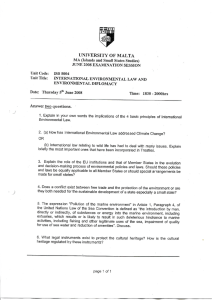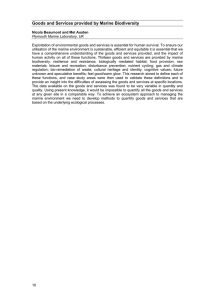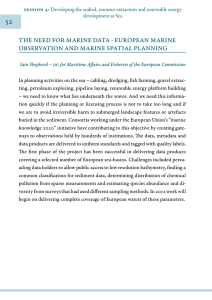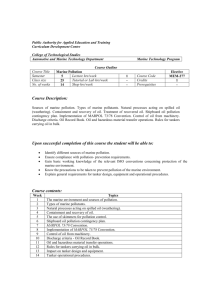Document 14867566
advertisement
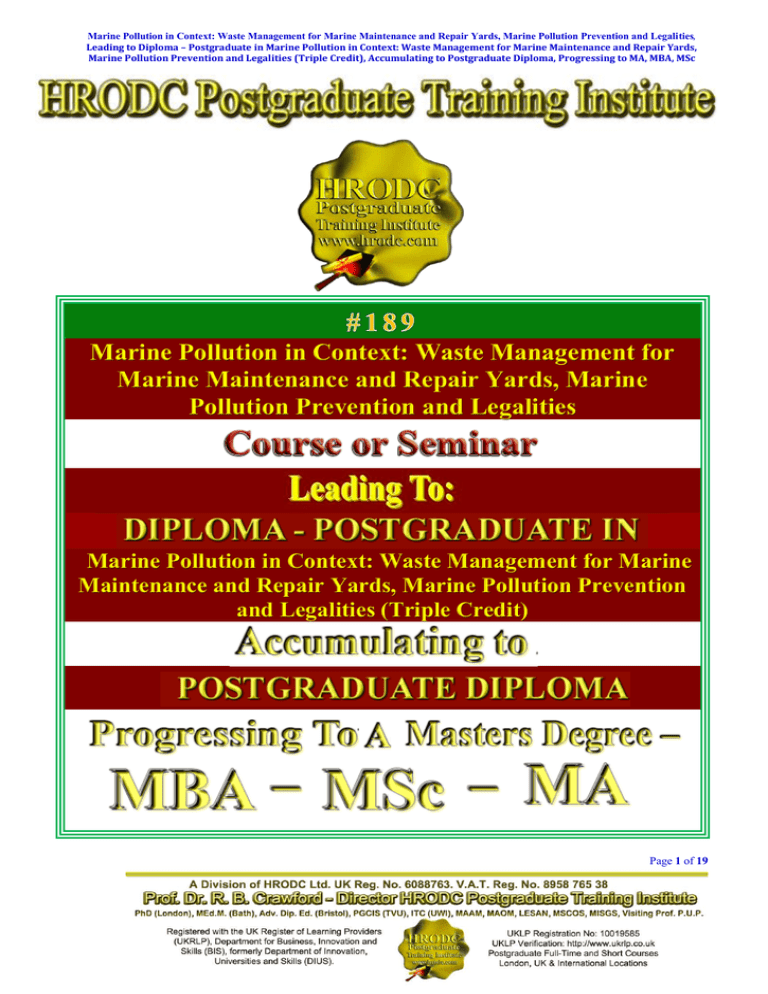
Marine_Pollution_in_Context_Waste_Management_for_Marine_Maintenance_and_Repair_Yards_Marine_Pollution_Prevention_and_Legalities_Fecal_Indicator_Bacteia_Phytoplankton_Shellfish_Poisoning_Fish_Vectored_Illness_Climate_C hange_Endoctrine_Disruption_Blue_Gym_Effect_Spill_Control_Shipboard_Oil_Pollution_Emergency_Plans_SOPEP_Oil_Record_Book_Course Marine Pollution in Context: Waste Management for Marine Maintenance and Repair Yards, Marine Pollution Prevention and Legalities, Leading to Diploma – Postgraduate in Marine Pollution in Context: Waste Management for Marine Maintenance and Repair Yards, Marine Pollution Prevention and Legalities (Triple Credit), Accumulating to Postgraduate Diploma, Progressing to MA, MBA, MSc Marine Pollution in Context: Waste Management for Marine Maintenance and Repair Yards, Marine Pollution Prevention and Legalities Marine Pollution in Context: Waste Management for Marine Maintenance and Repair Yards, Marine Pollution Prevention and Legalities (Triple Credit) Page 1 of 19 Marine_Pollution_in_Context_Waste_Management_for_Marine_Maintenance_and_Repair_Yards_Marine_Pollution_Prevention_and_Legalities_Fecal_Indicator_Bacteia_Phytoplankton_Shellfish_Poisoning_Fish_Vectored_Illness_Climate_C hange_Endoctrine_Disruption_Blue_Gym_Effect_Spill_Control_Shipboard_Oil_Pollution_Emergency_Plans_SOPEP_Oil_Record_Book_Course Marine Pollution in Context: Waste Management for Marine Maintenance and Repair Yards, Marine Pollution Prevention and Legalities, Leading to Diploma – Postgraduate in Marine Pollution in Context: Waste Management for Marine Maintenance and Repair Yards, Marine Pollution Prevention and Legalities (Triple Credit), Accumulating to Postgraduate Diploma, Progressing to MA, MBA, MSc Marine Pollution in Context: Waste Management for Marine Maintenance and Repair Yards, Marine Pollution Prevention and Legalities Marine Pollution in Context: Waste Management for Marine Maintenance and Repair Yards, Marine Pollution Prevention and Legalities (Triple Credit) Page 2 of 19 Marine_Pollution_in_Context_Waste_Management_for_Marine_Maintenance_and_Repair_Yards_Marine_Pollution_Prevention_and_Legalities_Fecal_Indicator_Bacteia_Phytoplankton_Shellfish_Poisoning_Fish_Vectored_Illness_Climate_C hange_Endoctrine_Disruption_Blue_Gym_Effect_Spill_Control_Shipboard_Oil_Pollution_Emergency_Plans_SOPEP_Oil_Record_Book_Course Marine Pollution in Context: Waste Management for Marine Maintenance and Repair Yards, Marine Pollution Prevention and Legalities, Leading to Diploma – Postgraduate in Marine Pollution in Context: Waste Management for Marine Maintenance and Repair Yards, Marine Pollution Prevention and Legalities (Triple Credit), Accumulating to Postgraduate Diploma, Progressing to MA, MBA, MSc Prof. Dr. R. B. Crawford – Director HRODC Postgraduate Training Institute PhD (University of London); MEd. M. (University of Bath); Adv. Dip. Ed. (University of Bristol); PGCIS (Thames Valley University); ITC (UWI); Member of the Standing Council of Organisational Symbolism (MSCOS); Member of the Asian Academy of Management (MAAM); Member of the International Society of Gesture Studies (MISGS); Member of the Academy of Management (MAOM); LESAN; Professor, HRODC Postgraduate Training Institute; Visiting Professor, Polytechnic University of the Philippines (PUP). Page 3 of 19 Marine_Pollution_in_Context_Waste_Management_for_Marine_Maintenance_and_Repair_Yards_Marine_Pollution_Prevention_and_Legalities_Fecal_Indicator_Bacteia_Phytoplankton_Shellfish_Poisoning_Fish_Vectored_Illness_Climate_C hange_Endoctrine_Disruption_Blue_Gym_Effect_Spill_Control_Shipboard_Oil_Pollution_Emergency_Plans_SOPEP_Oil_Record_Book_Course Marine Pollution in Context: Waste Management for Marine Maintenance and Repair Yards, Marine Pollution Prevention and Legalities, Leading to Diploma – Postgraduate in Marine Pollution in Context: Waste Management for Marine Maintenance and Repair Yards, Marine Pollution Prevention and Legalities (Triple Credit), Accumulating to Postgraduate Diploma, Progressing to MA, MBA, MSc For Whom This Course is Designed This Course is Designed For: Marine Engineer; Environmentalists; Ship Owners and Operators; Charterers; Insurers; Maritime Lawyers; Port and Harbour Authorities; Oil Spill Response Companies; Government Bodies; Anybody interested in learning about marine pollution. Duration: 15 Days Cost: £12,000.00 Per Delegate for UK Delivery £15,000.00 Per Delegate for Delivery outside the UK Please Note: V.A.T. (Government Tax) does not apply to Corporate Sponsored Individuals, taking Programmes or Courses in any location - within or outside the UK. It applies only to Individuals and Corporations based in the UK and to Non-UK Individual Residents taking courses in the UK. Cost includes: Free Continuous snacks throughout the Event Days; Free Hot Lunch on Event Days; Free City Tour; Free Stationery; Free On-site Internet Access; Page 4 of 19 Marine_Pollution_in_Context_Waste_Management_for_Marine_Maintenance_and_Repair_Yards_Marine_Pollution_Prevention_and_Legalities_Fecal_Indicator_Bacteia_Phytoplankton_Shellfish_Poisoning_Fish_Vectored_Illness_Climate_C hange_Endoctrine_Disruption_Blue_Gym_Effect_Spill_Control_Shipboard_Oil_Pollution_Emergency_Plans_SOPEP_Oil_Record_Book_Course Marine Pollution in Context: Waste Management for Marine Maintenance and Repair Yards, Marine Pollution Prevention and Legalities, Leading to Diploma – Postgraduate in Marine Pollution in Context: Waste Management for Marine Maintenance and Repair Yards, Marine Pollution Prevention and Legalities (Triple Credit), Accumulating to Postgraduate Diploma, Progressing to MA, MBA, MSc Diploma – Postgraduate – in Marine Pollution in Context: Waste Management for Marine Maintenance and Repair Yards, Marine Pollution Prevention and Legalities (Triple Credit); or Certificate of Attendance and Participation – if unsuccessful on resit. HRODC Postgraduate Training Institute’s Complimentary Products include: 1. HRODC Postgraduate Training Institute’s Leather Conference Folder; 2. HRODC Postgraduate Training Institute’s Leather Conference Ring Binder/ Writing Pad; 3. HRODC Postgraduate Training Institute’s Key Ring/ Chain; 4. HRODC Postgraduate Training Institute’s Leather Conference (Computer – Phone) Bag – Black or Brown; 5. HRODC Postgraduate Training Institute’s 8GB USB Flash Memory Drive, with Course Material; 6. HRODC Postgraduate Training Institute’s Metal Pen; 7. HRODC Postgraduate Training Institute’s Polo Shirt. **Please see product images, as a separate file - Complimentary Products For Students and Delegates, from HRODC Postgraduate Training Institute.** Daily Schedule: 9:30 to 4:30 pm. Location: Central London and International Locations Schedule - Part 4: http://www.hrodc.com/Course_Schedule_Part_4_London_Full_Time_Postgraduate_Di ploma_MA_MBA_MSc_Short_Courses_HRM_Petroleum_Oil_Gas_Accounting_Busine ss_English_Communication.htm Click to book this course: http://www.hrodc.com/Course_Booking_Form_London_Dubai_Kuala_Lumpur_Paris_ Johannesburg_Cairo_Jeddah_Abu_Dhabi_Kuwait_MBA_MSc_MA_Course.htm Page 5 of 19 Marine_Pollution_in_Context_Waste_Management_for_Marine_Maintenance_and_Repair_Yards_Marine_Pollution_Prevention_and_Legalities_Fecal_Indicator_Bacteia_Phytoplankton_Shellfish_Poisoning_Fish_Vectored_Illness_Climate_C hange_Endoctrine_Disruption_Blue_Gym_Effect_Spill_Control_Shipboard_Oil_Pollution_Emergency_Plans_SOPEP_Oil_Record_Book_Course Marine Pollution in Context: Waste Management for Marine Maintenance and Repair Yards, Marine Pollution Prevention and Legalities, Leading to Diploma – Postgraduate in Marine Pollution in Context: Waste Management for Marine Maintenance and Repair Yards, Marine Pollution Prevention and Legalities (Triple Credit), Accumulating to Postgraduate Diploma, Progressing to MA, MBA, MSc Leading to Diploma-Postgraduate Marine Pollution, Waste Management for Marine Maintenance and Repair Yards, Marine Pollution Prevention and Legalities (Triple Credit) Part 1: Essentials of Marine Environment and Human Health Marine Pollution in Context; Types of Inputs of Pollution Into the Ocean; Types of Pollution: Acidification; Eutrophication; Plastic Debris; Toxins; Underwater Noise. Part 2: Waterborne Pathogens Human Pathogens in the Marine Environment: Pathogens Introduced To the Oceans; Pathogens Indigenous To the Oceans; Pathogenic vs. Non-Pathogenic Microbes; Pathogen Distribution; Pathogen Detection. Fecal Indicator Bacteria: Indicator Bacteria, Defined; Fecal Indicator Bacteria Development and Usage; Page 6 of 19 Marine_Pollution_in_Context_Waste_Management_for_Marine_Maintenance_and_Repair_Yards_Marine_Pollution_Prevention_and_Legalities_Fecal_Indicator_Bacteia_Phytoplankton_Shellfish_Poisoning_Fish_Vectored_Illness_Climate_C hange_Endoctrine_Disruption_Blue_Gym_Effect_Spill_Control_Shipboard_Oil_Pollution_Emergency_Plans_SOPEP_Oil_Record_Book_Course Marine Pollution in Context: Waste Management for Marine Maintenance and Repair Yards, Marine Pollution Prevention and Legalities, Leading to Diploma – Postgraduate in Marine Pollution in Context: Waste Management for Marine Maintenance and Repair Yards, Marine Pollution Prevention and Legalities (Triple Credit), Accumulating to Postgraduate Diploma, Progressing to MA, MBA, MSc Fecal Indicator Test; Factors Leading to High Fecal Indicator Bacteria Numbers in Recreational Waters; Limitations; Water Quality Standards for Bacteria. Measures of Microbial Quality: The Ideal Indicator; The Alternative Indicators; Microbial Source Tracking. Molecular Methods; Microbial Measures vis-à-vis Human Health; Pathogens Modelling in Marine Waters: Modelling Aquatic Pathogens; Coupling Modelling and Remote Sensing; Fecal Indicator Bacteria: Use of Models in Management. Beach Regulation. Part 3: Estuarine and Marine Pollutants Public Perception; Priority Substances and Legislation; Contaminants: Industrial Engineering Contaminants; Other Contaminants. Nanoparticles: Sources and Environmental Behaviour. Plastics; Complex Mixtures; Climate Change and Pollutants. Page 7 of 19 Marine_Pollution_in_Context_Waste_Management_for_Marine_Maintenance_and_Repair_Yards_Marine_Pollution_Prevention_and_Legalities_Fecal_Indicator_Bacteia_Phytoplankton_Shellfish_Poisoning_Fish_Vectored_Illness_Climate_C hange_Endoctrine_Disruption_Blue_Gym_Effect_Spill_Control_Shipboard_Oil_Pollution_Emergency_Plans_SOPEP_Oil_Record_Book_Course Marine Pollution in Context: Waste Management for Marine Maintenance and Repair Yards, Marine Pollution Prevention and Legalities, Leading to Diploma – Postgraduate in Marine Pollution in Context: Waste Management for Marine Maintenance and Repair Yards, Marine Pollution Prevention and Legalities (Triple Credit), Accumulating to Postgraduate Diploma, Progressing to MA, MBA, MSc Part 4: Harmful Alga Blooms in Coastal Water of UK Phytoplankton: Mechanisms of Harm to Human Health; The Problem. Human Health Syndromes: Shellfish Poisoning. Causative Organisms And Toxins: Paralytic Shellfish Poisoning (PSP); Amnestic Shellfish Poisoning (ASP); Diarrhetic Shellfish Poisoning (DSP); Other Lipophilic Shellfish Poisoning (LSTs); Neurotoxic Shellfish Poisoning (NSP). Respiratory Illness; Fish Vectored Illness; Cyanobacteria; Harmful Phytoplankton vis-à-vis Human Wellbeing: Microflagellates; Other Dinoflagellates; Diatoms. Harmful in UK Coastal Waters: Shellfish Poisoning: Paralytic Shellfish Poisoning (PSP); Amnestic Shellfish Poisoning (ASP); Diarrhetic Shellfish Poisoning (DSP); Azaspiracid Poisoning (AZP). Other Harmful Phytoplankton in UK Waters: Karenia Mikimotoi; Other Dinoflagellates; Phaeocystis; Microflagellates; Page 8 of 19 Marine_Pollution_in_Context_Waste_Management_for_Marine_Maintenance_and_Repair_Yards_Marine_Pollution_Prevention_and_Legalities_Fecal_Indicator_Bacteia_Phytoplankton_Shellfish_Poisoning_Fish_Vectored_Illness_Climate_C hange_Endoctrine_Disruption_Blue_Gym_Effect_Spill_Control_Shipboard_Oil_Pollution_Emergency_Plans_SOPEP_Oil_Record_Book_Course Marine Pollution in Context: Waste Management for Marine Maintenance and Repair Yards, Marine Pollution Prevention and Legalities, Leading to Diploma – Postgraduate in Marine Pollution in Context: Waste Management for Marine Maintenance and Repair Yards, Marine Pollution Prevention and Legalities (Triple Credit), Accumulating to Postgraduate Diploma, Progressing to MA, MBA, MSc Diatoms and Silicoflagellates; Other Species of Pelagic Microplankton. Health Protection: Efficient Monitoring; Algal Toxins and Public Health ; Earning Warning Methodologies and Mitigation; Introduction and Transfers of New Species; Climate Change. Part 5: Harmful Alga Blooms in Coastal Water of New Jersey National (USA) Assessment of Harmful Algal Blooms; Health and Ecological Implications: Human Health Impacts; Ecological Impacts; Aesthetic/Economic Impacts. Part 6: Scientific Challenges for Marine Environment and Policy Needs Challenges for Marine Environment and Human Health: The Relationship among Ecosystem Integrity, Ecosystem Services and Human Health; Sustainable Industrial Development; Dealing with the Impacts of Climate Change; Better Prediction Systems for Natural Disasters; The Distribution and Risks of Marine Biogenic Toxins; Viral and Bacterial Pathogens from Sewage and Agricultural Run-Off; Emerging Risks; Conventional and Chemical Inputs. Endoctrine Disruption; Pharmaceuticals from the Sea; The ‘Blue Gym’ Effect; Page 9 of 19 Marine_Pollution_in_Context_Waste_Management_for_Marine_Maintenance_and_Repair_Yards_Marine_Pollution_Prevention_and_Legalities_Fecal_Indicator_Bacteia_Phytoplankton_Shellfish_Poisoning_Fish_Vectored_Illness_Climate_C hange_Endoctrine_Disruption_Blue_Gym_Effect_Spill_Control_Shipboard_Oil_Pollution_Emergency_Plans_SOPEP_Oil_Record_Book_Course Marine Pollution in Context: Waste Management for Marine Maintenance and Repair Yards, Marine Pollution Prevention and Legalities, Leading to Diploma – Postgraduate in Marine Pollution in Context: Waste Management for Marine Maintenance and Repair Yards, Marine Pollution Prevention and Legalities (Triple Credit), Accumulating to Postgraduate Diploma, Progressing to MA, MBA, MSc Public Health Needs: Health-Related Indices of Environment Impact; Seafood Safety; Environmental, Social and Economic Interactions. Developing Effective Environmental and Public Health Policies on a Regional and Global Scale Modelling; Policy Needs. Part 7: Waste Minimisation Options for Marine Maintenance and Repair Yards Chemical Stripping Waste; Abrasive Blast Wastes; Paint and Solvent Wastes; Equipment and Cleaning Wastes; Machine Shop Wastes; Engine Repair Shop Wastes; Specialty Shop Wastes; Vessel Cleaning Wastes; Spill Control. Part 8: Marine Pollution (MARPOL) Prevention: Reducing the Risk of Port State Control Detentions Marine Pollution (MARPOL); Preparing for a Port State Control Inspection. Part 9: Frequently Occurring Operational Deficiencies Oil and Oily Mixtures from Machinery Spaces; Retention of Oil on Board; Discharge Violation; Page 10 of 19 Marine_Pollution_in_Context_Waste_Management_for_Marine_Maintenance_and_Repair_Yards_Marine_Pollution_Prevention_and_Legalities_Fecal_Indicator_Bacteia_Phytoplankton_Shellfish_Poisoning_Fish_Vectored_Illness_Climate_C hange_Endoctrine_Disruption_Blue_Gym_Effect_Spill_Control_Shipboard_Oil_Pollution_Emergency_Plans_SOPEP_Oil_Record_Book_Course Marine Pollution in Context: Waste Management for Marine Maintenance and Repair Yards, Marine Pollution Prevention and Legalities, Leading to Diploma – Postgraduate in Marine Pollution in Context: Waste Management for Marine Maintenance and Repair Yards, Marine Pollution Prevention and Legalities (Triple Credit), Accumulating to Postgraduate Diploma, Progressing to MA, MBA, MSc Inconsistent Entries in Oil Record Books; Garbage; Cargo Residues; Shipboard Oil Pollution Emergency Plans (SOPEP). Tips to Reduce Pollution Part 10: Certificates and Documents that Should be Carried on Board Oil Pollution Prevention Certificate; Prevention Certificate for the Carriage of Noxious Liquid Substances in Bulk or Certificate of Fitness for the Carriage of Dangerous Chemicals in Bulk; Sewage Pollution Prevention Certificate; Air Pollution Certificate; Engine Air Pollution Prevention Certificates; Statement of Compliance for Condition Assessment Scheme (Tankers Only); Type Approval Certificate. Part 11: Oily Water Separator 15PPM Alarm; Oil Discharge Monitoring and Control System (Tankers Only); Oil/Water Interface Detector (Tankers Only); Sewage treatment Comminuting System, if fitted; Incinerator, if fitted; Exhaust Gas Cleaning System SOx, if fitted; Exhaust Gas Cleaning System NOx, if fitted. Part 12: All Ships Oil Record Book (Part 1); SOPEP; Page 11 of 19 Marine_Pollution_in_Context_Waste_Management_for_Marine_Maintenance_and_Repair_Yards_Marine_Pollution_Prevention_and_Legalities_Fecal_Indicator_Bacteia_Phytoplankton_Shellfish_Poisoning_Fish_Vectored_Illness_Climate_C hange_Endoctrine_Disruption_Blue_Gym_Effect_Spill_Control_Shipboard_Oil_Pollution_Emergency_Plans_SOPEP_Oil_Record_Book_Course Marine Pollution in Context: Waste Management for Marine Maintenance and Repair Yards, Marine Pollution Prevention and Legalities, Leading to Diploma – Postgraduate in Marine Pollution in Context: Waste Management for Marine Maintenance and Repair Yards, Marine Pollution Prevention and Legalities (Triple Credit), Accumulating to Postgraduate Diploma, Progressing to MA, MBA, MSc Garbage Management Plan; Garbage Record Book; Change over Procedure and Records – Sox Emission Control Areas; Bunker Delivery Notes; NOx Technical Files; Ballast Water Management Plan. Part 13: Tanker Specific Oil Discharging Monitoring and Control System (ODME) Manual; Crude Oil Washing Manual, if system fitted; Oil Record Book (Part 2); Access to Shore Based Damage Stability and Residual Strength Calculations; Dedicated Clean Ballast Tank Operation Manual; Damage Stability Approval; Vapour Emission Control Systems Procedure (Manual). Part 14: Chemical Carrier Specific (MARPOL Annex II) Shipboard Marine Pollution Emergency Plans (SMPEP); Procedures and Arrangements Manual; Cargo Record Book; Product Data Sheets with IMO Recognised Names for Cargoes. Part 15: Annexes Prevention of Pollution by Oil; Control of Pollution by Noxious Liquids in Bulk; Harmful Substances in Packages; Prevention of Pollution by Sewage from Ships; Prevention of Pollution by Garbage from Ships; Prevention of Air Pollution from Ships. Page 12 of 19 Marine_Pollution_in_Context_Waste_Management_for_Marine_Maintenance_and_Repair_Yards_Marine_Pollution_Prevention_and_Legalities_Fecal_Indicator_Bacteia_Phytoplankton_Shellfish_Poisoning_Fish_Vectored_Illness_Climate_C hange_Endoctrine_Disruption_Blue_Gym_Effect_Spill_Control_Shipboard_Oil_Pollution_Emergency_Plans_SOPEP_Oil_Record_Book_Course Marine Pollution in Context: Waste Management for Marine Maintenance and Repair Yards, Marine Pollution Prevention and Legalities, Leading to Diploma – Postgraduate in Marine Pollution in Context: Waste Management for Marine Maintenance and Repair Yards, Marine Pollution Prevention and Legalities (Triple Credit), Accumulating to Postgraduate Diploma, Progressing to MA, MBA, MSc Synopsis of Diploma – Postgraduate, Postgraduate Diploma and Postgraduate Degree Regulation Delegates studying courses of 5-9 days duration, equivalent to 30-54 Credit Hours (direct lecturer contact), will, on successful assessment, lead to the Diploma – Postgraduate. This represents a single credit at Postgraduate Level. While 6-day and 7-day courses also lead to a Diploma – Postgraduate, they accumulate 36 and 42 Credit Hours, respectively. Delegates and students who fail to gain the required level of pass, at Postgraduate Level will receive a Certificate of Attendance and Participation. The Certificate of Attendance and Participation will not count, for cumulative purpose, towards the Postgraduate Diploma. Courses carry varying credit values; some being double credit, triple credit, quad credit and 5-credit, etc. These, therefore, accumulate to a Postgraduate Diploma. As is explained, later, in this document, a Postgraduate Diploma is awarded to students and delegates who have achieved the minimum of 360 Credit Hours, within the required level of attainment. Credit Value and Credit Hours examples of Diploma – Postgraduate Courses are as follows: Single-Credit 30-36 Double-Credit 60-72 Triple-Credit 90-108 Quad-Credit 120-144 10-Credit (X36 Credit-Hours) to 12Credit (X30 Credit-Hours) 360 Page 13 of 19 Marine_Pollution_in_Context_Waste_Management_for_Marine_Maintenance_and_Repair_Yards_Marine_Pollution_Prevention_and_Legalities_Fecal_Indicator_Bacteia_Phytoplankton_Shellfish_Poisoning_Fish_Vectored_Illness_Climate_C hange_Endoctrine_Disruption_Blue_Gym_Effect_Spill_Control_Shipboard_Oil_Pollution_Emergency_Plans_SOPEP_Oil_Record_Book_Course Marine Pollution in Context: Waste Management for Marine Maintenance and Repair Yards, Marine Pollution Prevention and Legalities, Leading to Diploma – Postgraduate in Marine Pollution in Context: Waste Management for Marine Maintenance and Repair Yards, Marine Pollution Prevention and Legalities (Triple Credit), Accumulating to Postgraduate Diploma, Progressing to MA, MBA, MSc Other Credit Values are calculated proportionately. Because of the intensive nature of our courses and programmes, assessment will largely be in-course, adopting differing formats. These assessment formats include, but not limited to, in-class tests, assignments, end of course examinations. Based on these assessments, successful candidates will receive the Diploma – Postgraduate, or Postgraduate Diploma, as appropriate. In the case of Diploma – Postgraduate, a minimum of 70% overall pass is expected. In order to receive the Award of Postgraduate Diploma, candidate must have accumulated at least the required minimum ‘credit-hours’, with a pass (of 70% and above) in at least 70% of the courses taken. Delegates and students who fail to achieve the requirement for Postgraduate Diploma, or Diploma - Postgraduate - will be given support for 2 re-submissions for each course. Those delegates who fail to achieve the assessment requirement for the Postgraduate Diploma or Diploma - Postgraduate - on 2 resubmissions, or those who elect not to receive them, will be awarded the Certificate of Attendance and Participation. Applicants for Diploma – Postgraduate, Postgraduate Diploma and Postgraduate Degrees are required to submit the following documents: Completed Postgraduate Application Form, including a passport sized picture affixed to the form; A copy of Issue and Photo (bio data) page of the applicant’s current valid passport or copy of his or her Photo-embedded National Identity Card; Copies of credentials mentioned in the application form. Page 14 of 19 Marine_Pollution_in_Context_Waste_Management_for_Marine_Maintenance_and_Repair_Yards_Marine_Pollution_Prevention_and_Legalities_Fecal_Indicator_Bacteia_Phytoplankton_Shellfish_Poisoning_Fish_Vectored_Illness_Climate_C hange_Endoctrine_Disruption_Blue_Gym_Effect_Spill_Control_Shipboard_Oil_Pollution_Emergency_Plans_SOPEP_Oil_Record_Book_Course Marine Pollution in Context: Waste Management for Marine Maintenance and Repair Yards, Marine Pollution Prevention and Legalities, Leading to Diploma – Postgraduate in Marine Pollution in Context: Waste Management for Marine Maintenance and Repair Yards, Marine Pollution Prevention and Legalities (Triple Credit), Accumulating to Postgraduate Diploma, Progressing to MA, MBA, MSc On receipt of all the above documents we will make an assessment of the applicants’ suitability for the Programme for which they have applied; If they are accepted on their Programme of choice, they will be notified accordingly and sent Admission Letters and Invoices; One week after the receipt of an applicant’s payment or official payment notification, the relevant Programme Tutor will contact him or her, by e-mail or telephone, welcoming him or her to HRODC Postgraduate Training Institute; Non-European Students will be sent immigration documentation, incorporating a Visa Support Letter. This letter will bear the applicant’s photograph and passport details; Applicants will be notified of the dates, location and venue of enrolment and orientation; Non-UK students will be sent general information about ‘student life’ in the UK and Accommodation details. There are three delivery formats for Postgraduate Diploma Courses, as follows: 1. Intensive Full-time Mode (3 months); 2. Full-time Mode (6 month); 3. Video-Enhanced On-Line Mode. Whichever study mode is selected, the aggregate of 360 Credit Hours must be achieved. All short courses can accumulate to the required number of hours, for the Postgraduate Diploma, over a six-year period from the first registration and applies to both general and Page 15 of 19 Marine_Pollution_in_Context_Waste_Management_for_Marine_Maintenance_and_Repair_Yards_Marine_Pollution_Prevention_and_Legalities_Fecal_Indicator_Bacteia_Phytoplankton_Shellfish_Poisoning_Fish_Vectored_Illness_Climate_C hange_Endoctrine_Disruption_Blue_Gym_Effect_Spill_Control_Shipboard_Oil_Pollution_Emergency_Plans_SOPEP_Oil_Record_Book_Course Marine Pollution in Context: Waste Management for Marine Maintenance and Repair Yards, Marine Pollution Prevention and Legalities, Leading to Diploma – Postgraduate in Marine Pollution in Context: Waste Management for Marine Maintenance and Repair Yards, Marine Pollution Prevention and Legalities (Triple Credit), Accumulating to Postgraduate Diploma, Progressing to MA, MBA, MSc specialist groupings. In this regard, it is important to note that short courses vary in length, the minimum being 5 days (Diploma – Postgraduate) – equivalent to 30 Credit Hours, representing one credit. Twelve 5-day short courses, representing twelve credits or the equivalent of 360 Credit Hours are, therefore, required for the Award of Postgraduate Diploma. A six-day course (Diploma – Postgraduate) is, therefore, equivalent to 36 hours Credit Hours, representing one credit. Therefore, ten short courses, of this duration, equates to the required 360 Credit Hours, qualifying for the Award of Postgraduate Diploma. While doublecredit courses last between ten and fourteen days, triple-credit courses range from fifteen to nineteen days. Similarly, quad-credit courses are from sixteen to nineteen days. On this basis, the definitive calculation on the Award requirement is based on the number of hours studied (aggregate credit-value), rather than merely the number of credits achieved. This approach is particularly useful when a student or delegate studies a mixture of courses of different credit-values. For those delegates choosing the accumulative route, it is advisable that at least two credits be attempted per year. This will ensure that the required number of credit hours for the Postgraduate diploma is achieved within the six-year time frame. On the successful completion of the Postgraduate Diploma, students may register for the Masters Degree, after their successful completion of Course #7: Research Project: Design, Conduct & Report. The students’’ Degree Registration Category will be dictated by the courses or modules studied at Postgraduate Diploma Level. The categories relate to Master of Business Administration (MBA); Master of Arts (MA) Master of Science (MSc); Executive Master of Business Administration (Executive MBA). Page 16 of 19 Marine_Pollution_in_Context_Waste_Management_for_Marine_Maintenance_and_Repair_Yards_Marine_Pollution_Prevention_and_Legalities_Fecal_Indicator_Bacteia_Phytoplankton_Shellfish_Poisoning_Fish_Vectored_Illness_Climate_C hange_Endoctrine_Disruption_Blue_Gym_Effect_Spill_Control_Shipboard_Oil_Pollution_Emergency_Plans_SOPEP_Oil_Record_Book_Course Marine Pollution in Context: Waste Management for Marine Maintenance and Repair Yards, Marine Pollution Prevention and Legalities, Leading to Diploma – Postgraduate in Marine Pollution in Context: Waste Management for Marine Maintenance and Repair Yards, Marine Pollution Prevention and Legalities (Triple Credit), Accumulating to Postgraduate Diploma, Progressing to MA, MBA, MSc The title of the degree will be indicative of the specialism studied or its generalist nature, as exemplified below: Master of Science - Advanced Oil and Gas Accounting: International Petroleum Accounting (MSc Advanced Oil and Gas Accounting: International Petroleum Accounting); Master of Science - Accounting and Finance (MSc Accounting and Finance); Master of Science - Real Estate Management (MSc Real Estate Management); Master of Science - Tourism and International Relations (MSc Tourism and International Relations); Master of Science – Human Resource Training and Development Management (MSc HR Training and Development Management); Master of Business Administration (MBA); Executive Master of Business Administration (Executive MBA); Master of Business Administration – Finance (MBA Finance); Master of Business Administration – Accounting (MBA Accounting); Master of Arts - Human Resource Management (MA Human Resource Management); Master of Arts - Information and Communication Management (MA Information and Communication Management). The knowledge and skills gained from the research methods course will enable students to formulate their research proposal. With the guidance of their research methods tutor, they will submit a Synopsis or Research Proposal Page 17 of 19 Marine_Pollution_in_Context_Waste_Management_for_Marine_Maintenance_and_Repair_Yards_Marine_Pollution_Prevention_and_Legalities_Fecal_Indicator_Bacteia_Phytoplankton_Shellfish_Poisoning_Fish_Vectored_Illness_Climate_C hange_Endoctrine_Disruption_Blue_Gym_Effect_Spill_Control_Shipboard_Oil_Pollution_Emergency_Plans_SOPEP_Oil_Record_Book_Course Marine Pollution in Context: Waste Management for Marine Maintenance and Repair Yards, Marine Pollution Prevention and Legalities, Leading to Diploma – Postgraduate in Marine Pollution in Context: Waste Management for Marine Maintenance and Repair Yards, Marine Pollution Prevention and Legalities (Triple Credit), Accumulating to Postgraduate Diploma, Progressing to MA, MBA, MSc On the approval of their synopsis, their Masters Degree Registration will be formalised and they will, in earnest, begin their dissertation research. Students’ choice of Dissertation area and topic must closely reflect their specialism and expected Award Title; The Postgraduate Degree Award Board, which will convene twice during each Academic Year, will determine whether the rules have been complied with, in this regard, and will, where necessary, change a registered Award Title, to reflect the reality of a programme choice; The length of the Dissertation will be between 15,000 and 20,000 words. Higher or lower limits will be accepted through special dispensation only, tabled through their Dissertation Supervisors; Students will each be assigned one Main Dissertation Supervisor, for formal tuition, and a Dissertation Mentor, who will provide them with informal advice, in conjunction with their Main Dissertation Supervisor; Each Dissertation Mentor will also mediate the relationship between the Student and his or her Dissertation Supervisor; Students’ Viva Voce, or Oral, Examination will be conducted within 3 months of the submission of their Dissertation; The Dissertation Examination will be conducted by an External and an Internal Examiner; The External Examiner will be drawn from a recognized University and will be an Academic in the Discipline being examined, who is not otherwise associated with HRODC Postgraduate Training Institute; The Internal Supervisor will be an HRODC Postgraduate Training Institute’s tutor, who is neither the Students’ main Dissertation Supervisor or their Dissertation Mentor; The submission date of a Masters Dissertation is expected to be within 12 calendar months of a candidate’s initial registration for the Degree but can be extended, on application, to a period not exceeding 24 months; In the event that Students are not successful on their first attempt, they will be given the opportunity to make minor amendments to, or revise, their Dissertation, with the guidance of their Dissertation Supervisors. Page 18 of 19 Marine_Pollution_in_Context_Waste_Management_for_Marine_Maintenance_and_Repair_Yards_Marine_Pollution_Prevention_and_Legalities_Fecal_Indicator_Bacteia_Phytoplankton_Shellfish_Poisoning_Fish_Vectored_Illness_Climate_C hange_Endoctrine_Disruption_Blue_Gym_Effect_Spill_Control_Shipboard_Oil_Pollution_Emergency_Plans_SOPEP_Oil_Record_Book_Course Marine Pollution in Context: Waste Management for Marine Maintenance and Repair Yards, Marine Pollution Prevention and Legalities, Leading to Diploma – Postgraduate in Marine Pollution in Context: Waste Management for Marine Maintenance and Repair Yards, Marine Pollution Prevention and Legalities (Triple Credit), Accumulating to Postgraduate Diploma, Progressing to MA, MBA, MSc The maximum total submission and resubmission period should not exceed 36 calendar months from the date of first registration for a particular Masters Degree; Additional details and general aspects of these regulations are contained in the document: Masters Degree - Dissertation Guidelines. Terms and Conditions HRODC Policy Terms and Conditions are Available for viewing at: http://www.hrodc.com/COSTS.htm Or Downloaded, at: http://www.hrodc.com/Brochure_Download_Centre.Company_Brochures_Seminar_Brochur es_Seminar_Schedule.htm The submission of our application form or otherwise registration by of the submission of a course booking form or e-mail booking request is an attestation of the candidate’s subscription to our Policy Terms and Conditions, which are legally binding. Page 19 of 19

